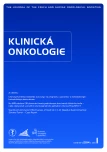-
Medical journals
- Career
Enzalutamid (Xtandi®) – nová šance pro pacienty s kastračně refrakterním karcinomem prostaty
Authors: J. Tomášek
Authors‘ workplace: Klinika komplexní onkologické péče LF MU a Masarykův onkologický ústav, Brno
Published in: Klin Onkol 2014; 27(1): 69-70
Category: Oncology Highlights
Overview
This actuality was supported by Astellas.
The author declares he has no potential conflicts of interest concerning drugs, products, or services used in the study.
The Editorial Board declares that the manuscript met the ICMJE “uniform requirements” for biomedical papers.Submitted:
19. 1. 2014
Sources
1. Scher HI, Fizazi K, Saad F et al. AFFIRM Investigators. Increased survival with enzalutamide in prostate cancer after chemotherapy. N Engl J Med 2012; 367 : 1187 – 1197.
2. Fleming MT. Long‑term responders to enzalutamide (ENZA) during the phase III AFFIRM trial: Baseline characteristics and efficacy outcomes. Prezentováno na ASCO - GU 2013.
3. De Bono J, Fizazi K, Shore N et al. Assessing the impact of prior treatments on the efficacy of enzalutamide (ENZ): A subanalysis of the phase 3 AFFIRM trial. Prezentováno na ESMO 2013, poster 2862.
4. Tran C, Ouk S, Clegg NJ et al. Development of a second-generation antiandrogen for treatment of advanced prostate cancer. Science 2009; 324(5928): 787 – 790.
5. Hu R, Denmeade SR, Luo L. Molecular processes leading to aberrant androgen receptor signaling and castration resistance in prostate cancer. Expert Rev Endocrinol Metab 2010; 5(5): 753 – 764.
6. ClinicalTrials.gov [homepage on the internet]. Available from: http:/ / www.clinicaltrials.gov/ ct2/ show/ NCT01889238?term=enzalutamide+and+breast&rank=3
Labels
Paediatric clinical oncology Surgery Clinical oncology
Article was published inClinical Oncology

2014 Issue 1-
All articles in this issue
- Cytokine Profiles of Multiple Myeloma and Waldenström Macroglobulinemia
- Double‑hit Lymphomas – Review of the Literature and Case Report
- Interaction between p53 and MDM2 in Human Lung Cancer Cells
- Surgical Treatment of Metastases and its Impact on Prognosis in Patients with Metastatic Colorectal Carcinoma
- MRI Based 3D Brachytherapy Planning of the Cervical Cancer – Our Experiences with the Use of the Uterovaginal Vienna Ring MR‑ CT Applicator
- Biosimilars (ne)jen v onkologii – dnešní realita i budoucnost
- Zajímavé případy z nutriční péče v onkologii
- Enzalutamid (Xtandi®) – nová šance pro pacienty s kastračně refrakterním karcinomem prostaty
-
Onkologie v obrazech
Umělecké projevy toxicity protinádorové léčby - Second Primary Cancers – Causes, Incidence and the Future
- Significant Anti‑tumor Effectiveness of Imatinib in C‑ kit Negative Gastrointestinal Stromal Tumor – Case Report
- Gastric Gastrointestinal Stromal Tumor with Bone Metastases – Case Report and Review of the Literature
- Knowledge Transfer at the RECAMO Summer School of 2013
- Clinical Oncology
- Journal archive
- Current issue
- Online only
- About the journal
Most read in this issue- Surgical Treatment of Metastases and its Impact on Prognosis in Patients with Metastatic Colorectal Carcinoma
- Enzalutamid (Xtandi®) – nová šance pro pacienty s kastračně refrakterním karcinomem prostaty
- Second Primary Cancers – Causes, Incidence and the Future
- Interaction between p53 and MDM2 in Human Lung Cancer Cells
Login#ADS_BOTTOM_SCRIPTS#Forgotten passwordEnter the email address that you registered with. We will send you instructions on how to set a new password.
- Career

